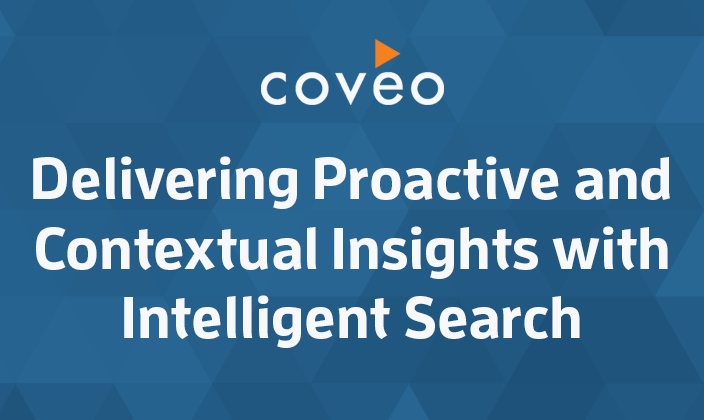Upgrading your search solution and upskilling your employees
Search has become so ingrained in our everyday lives. Whether we’re looking for driving directions or an email thread, we expect to find exactly what we’re looking for, in the context in which we’re searching for it. This kind of relevant search is expected as a consumer, so organizations should be expected to deliver this kind of relevant search to those interacting with their search solution, not only externally – but internally as well. Intelligent search is your vehicle for delivering proactive and contextual insights.
The sad reality of your intranet.
Unfortunately, the reality is that many companies are still in the stone age with outdated intranets and mediocre search solutions. We all know the pain that accompanies the out-of-the-box search tool. “This should be so easy to find” you think to yourself. You assume the query you are typing in is clear enough, and that it should be delivering valuable and relevant results within the blink of an eye. But suddenly, you hit a wall; the dreaded “zero results” page. At this point, you’re wondering what the lesser of two evils might be. Do you waste time by trying to find this information manually (because surely it must exist somewhere!), or do you try and decipher your company’s org chart to figure out who might be able to help you get the answers you seek (even though they have 101 other, more pressing, things to do)? You know the struggle is real, and unfortunately, likely so do your knowledge workers.
It should be, and can be, easier – with an Intelligent Workplace.
Powered by machine learning, the Intelligent Workplace proactively suggests relevant content and experts. This is particularly useful when your knowledge workers are in need of information to complete a task but may not know exactly what to search for, or the proper keyword to use in their query. An Intelligent Workplace anticipates your employees’ needs and will prompt them for the right keyword or phrase with “did you mean,” and suggest possible content or alternatives to help them get the right answers.
Download our eBook, Guide to Building an Intelligent Workplace.
What happens if knowledge workers are really stuck and don’t know where to begin?
Part of the Intelligent Workplace’s magic comes from intelligent search. Think of your best friend; the friend who knows everything about you, the one that always finishes your sentences for you, the one that always has the solution to your problems. That’s what intelligent search is to your employees.
By understanding each employee’s context within your organization, intelligent search overcomes the barrier of not knowing where to start with a query. It recognizes who each person is, what their role is and what has helped other people in similar roles. Giving context to search is a key differentiator from standard search as it can then synthesize all the information residing in the cloud index, to deliver only the most relevant content, specific to the person starting the query. The insights intelligent search generates enables it to automatically suggest related topics of interest, like recommending and ranking relevant experts within your organization whom have previously authored material about the topic, even without completing a search query.
Including filters for further relevance.
The Intelligent Workplace unifies all information from across your entire ecosystem of record. This means contracts, e-mails, pdf’s, chat logs, support information, tutorials and much more are all accessible. While that is great news, it can also be overwhelming. Filters help narrow down the amount of search results so knowledge workers can easily identify the exact content or expert they need. For further relevance and optimal results, filters should be pre-set and customized based on their role, department, location, authentication rights, metadata, and tasks they are working on.
Personalizing the experience with role-based interfaces.
Remember Toby from the television show, The Office? Toby is a one man HR department. Toby has no interest in sales contracts, support articles, or tutorials on how to walk clients through their paper buying journey. What Toby would benefit from is a user interface that will present him with information he needs on a daily basis to do his job. Things like job applications, complaints from Dwight, resumes, job postings, e-mails to and from prospective hires, etc. By creating a customized role based user interface, Toby could easily check in on the latest applications, while cross referencing their resumes within the same search. You don’t need to be fans of The Office to understand Toby and feel his pain.
Alternatively, consider your customer support analysts that spend most of their time working in a CRM tool like Salesforce Service Cloud and how they would benefit from having an integrated search application that deliver insights directly within it. Whenever a support analyst opens a case, the insight panel will automatically surface suggestions on related cases, relevant articles in the knowledge base and colleagues who have worked on the same type of problem before.
Delivering proactive and contextual insights allows you to maximize the potential of your employees, increase the proficiency of your organization and scale with ease. To know more about Intelligent Search, and how it can transform your workplace, download our eBook, Guide to Building an Intelligent Workplace.


